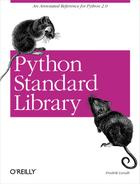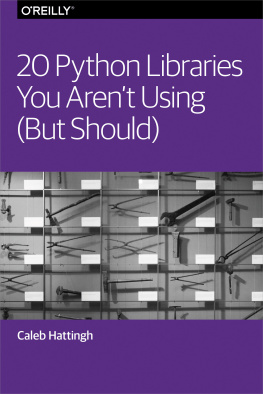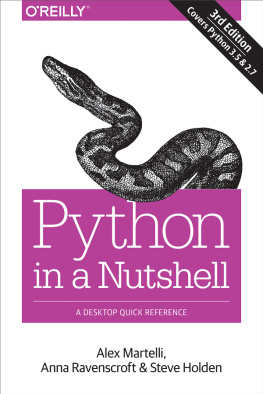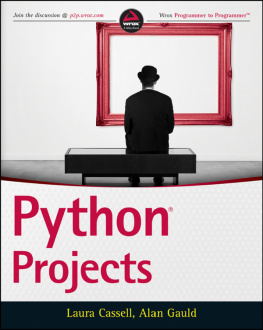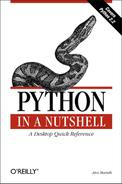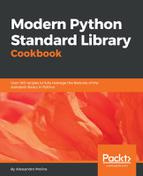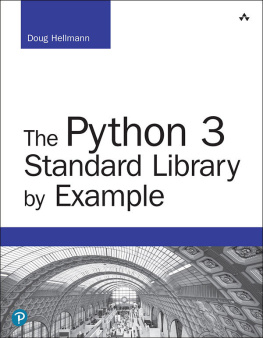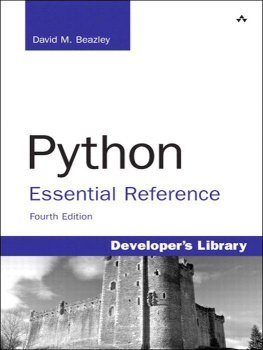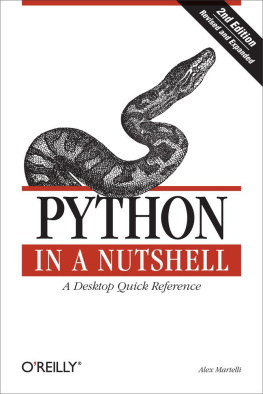Fredrik Lundh - Python standard library
Here you can read online Fredrik Lundh - Python standard library full text of the book (entire story) in english for free. Download pdf and epub, get meaning, cover and reviews about this ebook. City: Beijing, Cambridge Mass, year: 2001, publisher: OReilly Media, Inc., genre: Computer. Description of the work, (preface) as well as reviews are available. Best literature library LitArk.com created for fans of good reading and offers a wide selection of genres:
Romance novel
Science fiction
Adventure
Detective
Science
History
Home and family
Prose
Art
Politics
Computer
Non-fiction
Religion
Business
Children
Humor
Choose a favorite category and find really read worthwhile books. Enjoy immersion in the world of imagination, feel the emotions of the characters or learn something new for yourself, make an fascinating discovery.
- Book:Python standard library
- Author:
- Publisher:OReilly Media, Inc.
- Genre:
- Year:2001
- City:Beijing, Cambridge Mass
- Rating:5 / 5
- Favourites:Add to favourites
- Your mark:
- 100
- 1
- 2
- 3
- 4
- 5
Python standard library: summary, description and annotation
We offer to read an annotation, description, summary or preface (depends on what the author of the book "Python standard library" wrote himself). If you haven't found the necessary information about the book — write in the comments, we will try to find it.
Python standard library — read online for free the complete book (whole text) full work
Below is the text of the book, divided by pages. System saving the place of the last page read, allows you to conveniently read the book "Python standard library" online for free, without having to search again every time where you left off. Put a bookmark, and you can go to the page where you finished reading at any time.
Font size:
Interval:
Bookmark:
Copyright 2001 O'Reilly Media, Inc.

Wed like to pretend that Fredrik is a role, buteven hundreds of volunteers couldnt possibly keep up. No,Fredrik is the result of crossing an http server with aspam filter with an emacs whatsit and some other stuff besides.
The Python 2.0 distribution comes with an extensive standard library,comprised of over 200 modules. This book briefly describes each module and provides one or more sample scripts showing how to use it.All in all, this book contains 360 samplescripts.
Those people who have nothing better to do than post onthe Internet all day long are rarely the ones who have the most insights.
Since I first stumbled upon Python some five years ago, Ive spenthundreds of hours answering questions on thecomp.lang.python newsgroup. Maybe someone found amodule that might be exactly what he wanted, but he couldnt reallyfigure out how to use it. Maybe someone had picked the wrong modulefor the task. Or maybe someone tried to reinvent the wheel. Often, ashort sample script could be much more helpful than a pointer to thereference documentation.
After posting a couple of scripts each week, for a number of years,you end up with a rather large collection of potentially usefulscripts. What youll find in this book are the best parts from over3,000 newsgroup messages. Youll also findhundreds of new scripts added to make sure every little nook andcranny of standard library has been fully covered.
Ive worked hard to make the scripts both understandable and adaptable.Ive intentionally kept the annotations as short as possible. If youwant more background, theres plenty of reference material shippedwith most Python distributions. In this book, the emphasis is on thecode.
Comments, suggestions, and bug reports are welcome. Send them to. I read all mail as soon as itarrives, but it might take a while until I get around to answering.
For updates, addenda, and other information related to this book,point your web browser to http://www.pythonware.com/people/fredrik/librarybook.htm
This book covers the entire standard library, except the (optional)Tkinter user-interface library. There are several reasons for this,mostly related to time, space, and the fact that Im working onseveral other Tkinter documentation projects.
For current status on these projects, see http://www.pythonware.com/people/fredrik/tkinterbook.htm.
This book was written in DocBook SGML. I used a variety of tools,including Secret Labs PythonWorks, Excosoft Documentor, JamesClarks Jade DSSSL processor, Norm Walshs DocBook stylesheets,and a bunch of Python scripts, of course.
Thanks to my referees: Tim Peters, Guido van Rossum, David Ascher,Mark Lutz, and Rael Dornfest, and the PythonWare crew: Matthew Ellis,Hkan Karlsson, and Rune Uhlin.
Thanks to Lenny Muellner, who turned my SGML files into thebook you see before you, and to Christien Shangraw, who pulled all thedifferent text and code files together for the book and the CD-ROM(view CD-ROM content online at http://examples.oreilly.com/pythonsl).
The following typographic conventions appear in this book:
Is used for filenames and command names. It isalso used to defineterms the first time they appear.
Constant WidthIs used in examples and in regular text to showmethods, modules, operators, functions, statements, and attributes.
Unless otherwise noted, all examples run under Python 1.5.2 and Python2.0. Ive tried not to depend on internal details, and I expect mostscripts to work with upcoming 2.x versions as well.
The examples have been tested on Windows, Solaris, and Linux. Exceptfor a few scripts that depend on platform-specific modules, theexamples should work right out of the box on most other platforms aswell. (If you find something that doesnt work as expected, let me know!)
All code is copyrighted. Of course, youre free to use one or moremodules in your own programs, just dont forget where you got them.
Most script files are named after the module theyre using, followedby the string -example- and a unique serial number. Note that the scripts sometimes appearout of order; its done this way on purpose, to match the filenamesused in an earlier version of this book, (the eff-bot guideto) The Standard Python Library.
Youll find copies of all scripts on the CD provided with thisbook (see http://examples.oreilly.com/pythonsl). For updates and more information, seehttp://www.pythonware.com/people/fredrik/librarybook.htm.That page also explains what you need to know to decrypt and unpackthe archive.
You can write to:
| OReilly & Associates, Inc. |
| 101 Morris Street |
| Sebastopol, CA 95472 |
| 1-800-998-9938 (in the U. S. or Canada) |
| 1-707-829-0515 (international/local) |
| 1-707-829-0104 (FAX) |
You can also send us messages electronically. To be put onthe mailing list or request a catalog, send email to:
To ask technical questions or comment on the book, send emailto:
We have a web site for the book, where well list examples,errata, and any plans for future editions. You can access this pageat:
http://www.oreilly.com/catalog/pythonsl/
For more information about this book and others, see the OReillyweb site:
http://www.oreilly.com
Since the functions in the C runtime library are not part ofthe Win32 API, we believe the number of applications that will beaffected by this bug to be very limited.
Pythons standard library covers a wide range of modules. It includes everythingfrom modules that are as much a part of the Python language as thetypes and statements defined by the language specification, to obscuremodules that are probably useful only to a small number of programs.
This chapter describes a number of fundamental standard librarymodules. Any larger Python program is likely to use most of thesemodules, either directly or indirectly.
The following two modules are even more basic than all other modules combined: the_ _builtin_ _module, which defines built-in functions (like len,int, and range), and theexceptionsmodule, which defines all built-in exceptions.
Python imports both modules when it starts up, and makes their contentavailable for all programs.
There are a number of modules modeled afterthe POSIX standard API and the standard C library that provide platform-independentinterfaces to the underlying operating system.
The modules in this group include os, which provides file andprocess operations, os.path, which offers aplatform-independent way to pull apart and put together filenames,and time, whichprovides functions to work with dates and times.
Font size:
Interval:
Bookmark:
Similar books «Python standard library»
Look at similar books to Python standard library. We have selected literature similar in name and meaning in the hope of providing readers with more options to find new, interesting, not yet read works.
Discussion, reviews of the book Python standard library and just readers' own opinions. Leave your comments, write what you think about the work, its meaning or the main characters. Specify what exactly you liked and what you didn't like, and why you think so.

